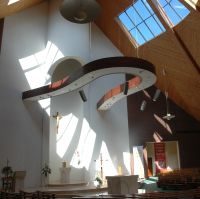
How did you come to be working in the AV/installation business? I had been working on live sound with bands for a number of years, and – more by luck than anything else – I started to get involved with a few installations around 1992. A number of those projects involved houses of worship, and I began to get a good reputation among church leaders. One project sold the next, and as a result we found ourselves specialising in the church market. The company has grown steadily over time, to the point where we now have a seven-strong team. Churches represent the majority of our business, but we have also done projects in schools, football grounds, hotels, bars/clubs, and more. In what ways has the use of audio in churches changed during the time you have been active in the market? About 15 years ago, a lot of churches were being fitted with very simple systems. There was a belief that 1500-2000 euros could you get a good system. We were one of the first companies in Ireland to say that that wasn’t quite right; that you could do better and could put in higher quality loudspeakers, processing and control systems. Simultaneously, churches have recognised that their congregations have increasingly high expectations of audio. They expect good sound because they are used to it from their own TVs and stereo systems. Our basic philosophy is that the system has to be simple for the end-user. They need to be able to turn it on and have it work, so our focus is on reducing [the control requirements] to 1 or 2 switches. People really seem to like that approach. In general, are church staff more knowledgeable about audio than they were, say, 10 years ago? I would say that there is definitely an increased awareness of quality, but they might not necessarily know to express that in acoustic or technical terms. They will know what sounds good, or they will have been to another church where they were impressed by the audio. Their objective in purchasing a new audio system will be clear; our job is to provide the right solution for their needs. BSS Soundweb processing technology has been an important part of achieving these easy-to-use designs, and I would say that we have now undertaken about 150 Soundweb installations, 100 or more of those in churches. With Soundweb, I like the fact that once the system has been programmed and set-up, it is relatively easy for the end-user to come in, use the presets and get the sound that they require. It’s a no-hassle approach. So do you have a list of preferred brands, or do you approach specification on a strictly project-by-project basis? We do consider each project on an individual basis, but we tend to stick with Bose, Community, and Harman brands such as JBL and Soundweb. We have a good relationship with [UK/ROI Harman distributor] Sound Technology and have just been given some JBL demonstration speakers, CBT 70s. We have already sold a pair based on the demo and think that they are going to be successful for us; it’s a nice-looking product which fits into places where large traditional boxes wouldn’t necessarily be suitable. Requirements vary depending on the tradition of the church in question, but what we often do is provide Soundweb control for normal day-to-day events – funerals, weddings, etc – along with the ability to switch to a mixing desk for praise bands. That’s a fairly typical set-up these days. Presumably some spaces are more acoustically challenging than others…? A church that was built 200 years ago is not necessarily going to be designed for the sort of sound systems available today. You are going to encounter long RTs, but we are usually able to find ways of dealing with those as we also have an acoustic consultancy within our company. This definitely gives us an advantage in the market and it’s something we will look to expand in the future. In a very reverberant church, you will never get the sound quite right no matter what loudspeaker you use if you focus on the equipment only; you have to take a very holistic approach to each space and consider the acoustics and the technology together. The Republic of Ireland’s perilous economic state is in the international news once again at the time of writing (November 2010), with the government applying for loans from the EU and the IMF, so how are your activity levels at present? I think everyone is suffering at the moment, and this has probably been one of the quieter years in recent times. Having said that, the church market does seem to be relatively stable. We expect fewer projects in the south of Ireland next year, but on the other hand, there seems to be an increase of interest in the north – so hopefully it will all balance out. The economic situation in Ireland is unbelievably bad, and I don’t foresee any major projects taking place in the hotel or bar/pub trade over the next year. Hopefully things will improve the year after that if there is more liquidity in the banking system, but for now I think a lot of people are in survival mode. No one wants to do anything outrageous or hugely different; they are content to tick along and if they are making a small profit, they are happy to be in that situation. In what ways do you think your company has changed the perception of audio in Irish churches? Apart from the focus on high quality systems and acoustic treatments, we have been very aware of the aesthetics of these buildings and what they mean to people. In every single case, it’s vital to consider what is going to work in that space and will give good, clear intelligibiity to all members of the congregation, as well as ensuring that it will look good and not distract from the existing aesthetics of the building. So, as I said earlier, an holistic approach is essential. Martin Grainger was talking to David Davies. www.graingercommunication.com







